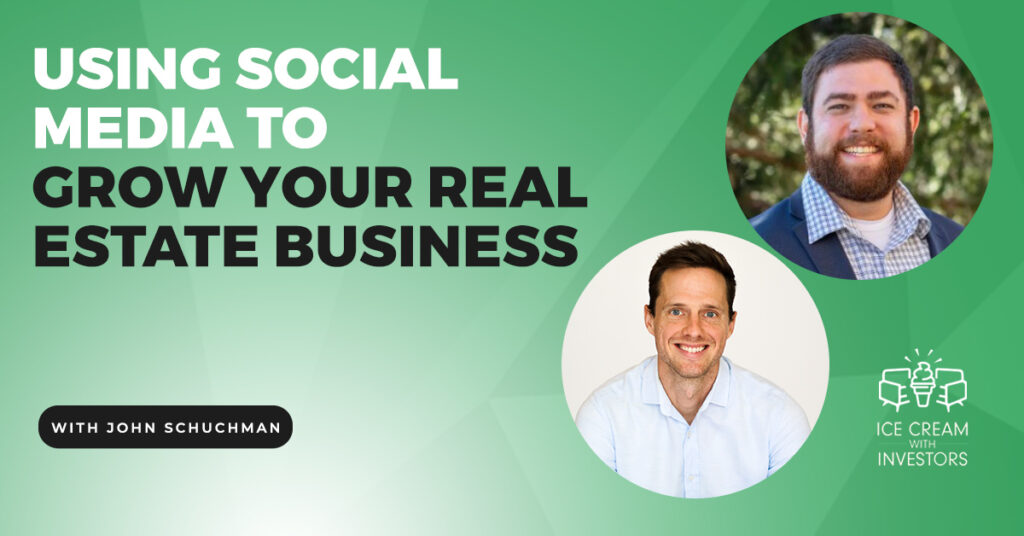When going into business, leveraging different tools is essential. But what tool is available on your end? In today’s scoop, John Schuchman, a REALTOR® in Lancaster, shares how you can use social media to grow your real estate business. He explains when using social media platforms, you don’t have to overwhelm yourself. Instead, you should focus on the platform that works for you. John added that you should also add your phone number on your bio so clients can easily reach out to you. To hear more of John’s insightful talk, tune in to this episode now!
Check out John’s Book recommendations!
The Wealth Of Connection: A New Approach to Making Business Personal by Vincent Pugliese
Connect with John Schuchman through the following
Website: https://therealestatesurvivalguide.com/
Facebook: https://www.facebook.com/JohnSchuchman/
LinkedIn: https://www.linkedin.com/in/johnschuchman/
Instagram: @john_schuchman
—
Watch the episode here
Listen to the podcast here
Using Social Media To Grow Your Real Estate Business With John Schuchman
John, welcome to the show.
Thank you so much for having me, Matt. I’m honored to be here. Whenever I do an interview like this, I want to start by thanking you for what you’re doing. I have a podcast as well. It often can feel like a thankless job. Thank you for what you’re doing to help investors and help people with their thoughts about real estate. I think the topic is really cool. Ice Cream with Investors is a cool way to combine talking about real estate investing in a fun way. Thank you for what you’re doing to help people. Thanks for having me.
It’s been one of the most fun journeys ever that I’ve been on hosting this show. I appreciate you saying that. We like to start with a difficult question. What’s your favorite ice cream?
Cookies and cream.
We’ve got some cookies and cream downstairs now.
It’s so good.
Are you a toppings guy?
I’m not. I’m so boring. The only topping I ever put on anything is ketchup on stuff. I don’t dip stuff. Not on ice cream, but I’ll eat it right out of the cart just like that.
You’re near Hershey, Pennsylvania, so I thought you were going to go somewhere like Hershey.
I did not. It’s funny because I prefer Turkey Hill ice cream. I hope the people at Hershey don’t hear this.
John, tell our audience, what’s the scoop? What do you do now?
Things are shifting a little bit for me. Most of what I do is residential real estate. I’m a realtor here in Lancaster, PA. A lot of what I’ve done is helping clients buy and sell properties. I’ve been a realtor for three years and every year I add something. I’ve added a podcast to help realtors. I’ve added a membership community for realtors. I’m sure we’ll get into our financial journey, but in the last six months, we paid off our house. A lot of investors say we’re crazy.
You and I were talking before we started recording about it’s half math and half emotion. For us, it was a hard thing to pay that off. It was a 2.5% interest rate. Part of me sometimes regrets it, but we did it. We went down to Dave Ramsey in late November. We did our debt-free screen, but I’m shifting. The reason I say that is the more I’m in real estate, the more I’m like, the longer you’re in it, the more you start working with investors.
I’m thinking about rentals and Airbnbs. I’ve been like, “I would not have done it differently.” We’re glad we did it. Now I’m shifting. I’m probably different than most of your guests who are already investing because I had a crazy journey, and I’m getting into investing now and starting to do a lot of research before we jump at a property or opportunity. That’s what I do. It’s been a ton of fun. Until four years ago, I was in any W-2 job that you could imagine, so 9:00 to 5:00 job. I never could stick in a job.
It wasn’t until I found real estate that I found my niche. I love what I do for my clients. Now with the podcast, the membership, and the realtors that I coach, I love helping investors as they think about their first property. I try to run numbers with them and try to make them understand, and assume the worst-case scenario, “Do the numbers on this property still make sense?”
We don’t want to expect it to be like a Cinderella story where your Airbnb’s booked out 99% of the time. Let’s look at the worst-case scenario. If the numbers still look good there, then this is probably a good opportunity for you to jump into. It’s how things have shifted. It’s a lot of fun. I love what I do and the clients I get to serve and it’s been a crazy journey.
I want to get into your journey on the real estate side, but before we get there, we were talking about this Dave Ramsey experience that you went on. I’ll start there, 2.5% interest rates would say, “Matt, you should hold that property for as long as you can and basically never pay a dollar over what you’re required to pay,” but then there’s the emotional side of it. Your story was that you were having a child or right in the middle of having your first child or second child at the time, and decided to go on that journey. First of all, let’s start with, what did your situation look like at the time?
I shared briefly about all these W-2 jobs. February 26th, 2019, I’ll always be scarred by the day. I lost my last W-2 job. From that point, and this is the 30-second version, I started to gain my real estate license that summer. I continued applying for 9:00 to 5:00 jobs at banks. I was in banking at the time. No one would hire me.
From February 26th, 2019, when I lost my last W-2 job to June 2020, I made $10,000 in real estate. I got licensed officially that August 2019. I did not sell my first property until April, and then June was my second settlement. I think it was $10,000. A lot of us were huge people of faith and I feel like God blessed us because we survived.
My wife was making $35,000. We somehow made it. It’s nice to look back now but it was hard. The cool part was we were so broke. We lived off my wife’s income. We made it work on the $35,000 or $40,000 a year. When I started making good money, then we were like, “We can save money or put this towards the house.”
I’m a spender and many of your audience probably know Dave Ramsey and don’t like a lot of his things. What I do think Dave Ramsey says that is good is not having consumer debt. This device right here, the iPhone, the Apple Watch, and the Apple everything, I always had the latest and greatest. I would put it on a credit card. I would buy this. I don’t necessarily agree with what he says about real estate because even if you have a 5% interest rate on your home, but you could invest the cash you have to a hard money lender for 10%, the numbers make sense to invest the money.
Even in real estate, I see this so much with realtors. They’re buying this and buying that. I’m like, “How are you paying for this?” “I’m putting it on a credit card.” That is where his program is amazing for people. I’m not good with money. I never was. When my wife met me, I think we were about 27 years old. When we both met, I had worked for twelve years and I had nothing to show for it. I still remember the year I met her in 2014. We met in November. That December on Christmas Eve, I was trying to buy Christmas presents and hoping I had enough money in the account.
I think so much of what I’ve done is built from pain. We paid off the house and maybe the numbers didn’t make sense but we were like, “We want our primary residents free and clear.” I create a six-figure income in real estate, but God forbid something happens and the market crashes, whatever. At least our house is paid off. It’s been a wild journey, but I’m always going to have that pain of remembering that Christmas that she met me, realizing I had $300 in my bank account trying to buy all these gifts and hoping the card didn’t decline.
That’s how I managed money. I wasn’t good at it. I’ve shifted a lot in the last 6 to 7 years. I would encourage your audience, whether you’re investing and you have 1 property or 100, always remember what got you there. My journey is filled built from pain. I never want to forget what that was like. I never want to forget even getting married, having an apartment for $800 a month, and making $70,000 total and being like, “Where’s all our money going?” We were eating out. We were buying stuff. That’s a good journey. That’s why I’m so passionate about not having consumer debt.
Always remember what got you there, whether you’re investing with one property or a hundred.CLICK TO TWEET
I’ve heard of debt snowball or debt avalanche, and all these different terms out there. Where did you all start? It was more than just your primary residence if I’m not mistaken.
Through our church at the time, someone talked about Dave Ramsey. For some of you tuning in to this and you’re the spouse that is always dragging your feet, that was me. She wanted me to get involved. She’s like, “Let’s go to this class.” I’m like, “Fine, I’ll go.” We went and I was not interested. She did a good job of being patient, but she showed me the numbers.
In the apartment, we were there probably a year or two. We wanted to buy a house and she’s like, “That’s great. Look at the numbers. Here’s the budget. Here’s what we make. Here’s what we spent.” At the worst of it, we probably spent $1,000 a month eating out every night. We were two young married people, so we didn’t cook.
The debt that we had paid off was my college. I owed about $30,000 to $50,000. I think about closer to $30,000. When I met her, I had just bought a car. I owed about $15,000 there in credit card debt, probably another $15,000 or $20,000. It’s basically what Dave says on the show, all the stupid. That’s where I’m like, “If you’re buying properties and they cashflow but you’re getting a mortgage, great. I will not say don’t do that.” Dave might and that’s why I disagree a little good bit.
I would say don’t be taking out loans to buy a car. Matt, I want to drive a Tesla one day so badly. My hope and prayer are I would pay in cash. That means saving up a lot of cash, but I feel like for anything that’s a depreciating asset, I’m not going to finance that. A home appreciates in value. A mobile home and a car depreciate. I don’t want to finance those things. It was all the debt you could imagine.
Before we shift into our next portion of this conversation, there are people out there that want their spouse or partner to be on board with their financial journey, whether that’s investing in real estate, starting your own business, or doing whatever but they seem to struggle with that conversation. What best practices would you share with us being on the other side of that, the person that was resistant, on how your wife’s message was able to get through to you so that you would be able to receive it?
Right before we went to Dave Ramsey’s studio in Nashville, I had her on my podcast. She did not want to do it for the longest time. I said, “People want to hear your side of this journey.” I asked her at that time what it was like. She’s like, “I knew you were stubborn. I knew that I had to be patient. I knew that if I forced you to do this, you were going to quit or hide money behind my back. That’s not healthy in a marriage.” She learned from the courses from Dave Ramsey the free spirit and the spender. I was the spender.
I remember even talking to her about spending money. She’s like, “Let’s do $50.” I was like, “A day or a week?” She’s like, “A month.” I’m like, “I love going to the movies. That’s a trip to the movies and popcorn.” What she had to learn at the beginning was the eating out budget and the spending money was a lot more than she wanted, but at least we were tracking it.
Even if it was $300 a month, at least we’re tracking it. She’s a saint. She was so patient. She supported me, encouraged me, prayed for me, and let it go. I think from the time we first started in the class to when I was like, “I’m on board.” It was probably about 6 to 12 months. It was a lot. Once I was on that, I was listening to the Dave Ramsey podcast every day working.
It was like this switch that went off because I knew we were wasting money. If your spouse is not on board, you need to have a conversation with them and say, “What can we do?” For those of you that are investors and your wife or husband doesn’t want to do it, they might be saying to you or vice versa, “If we want to invest in this property, we can’t be buying cars, iPhones, and this.” Everything in a relationship is give and take. What are you willing to give? What are you willing to take?

Social Media: Everything in a relationship is give and take. What are you willing to give? What are you willing to take?
As I think about investing, I’m up here in the clouds. She’s got to pull me down. This is the reverse now, if I want her to be on board with the investing, I need to say, “Here are the numbers. Here’s why it makes sense. Here’s the cashflow. Here’s the appreciations over the next year, 5 years or 10 years,” and show her the numbers. She needs to see the numbers to feel confident in it, but in terms of the debt free, you got to be patient with your spouse.
I do think one of the great things about Dave’s program is he talks about the free spirit and the spender. Usually one of you is a spender and one’s a free spirit. The spender can’t say to the person who wants to save, “You have to spend this money,” just like the saver can’t say, “You’re not allowed to spend money.” Everything’s about balance. Where can you support each other and find balance?
I like how you said if you want to get to her on investment, you have to give her the details where she had to pull you down a little bit. One of my big philosophies is to meet people where they are. You’re framing up this conversation that people come at different problems from different angles. You need to come at it from that same angle if you want to make an impact. I know I said last question, but this is the last question, I promise. Did you have an area in your budget where you said, “This is my spending area. We can cut here and here, but this area is where I care about, and I’m not going to feel bad about spending money here?”
Meet people where they are. And you’re framing up this conversation that people come at different problems from different angles, and you need to come at it from that same angle to make an impact.CLICK TO TWEET
I think so. Maybe these are silly examples but I hope they help people. I love and I’ve tried to stop drinking it because it’s terrible for you. I love Pepsi and I love going to the movies as I mentioned. I had movie passes back in the day. Now I have the Regal Unlimited. She didn’t say, “Don’t go to the movies.” She’s like, “You could spend $200 a year on the unlimited plan because it’s going to save you money in the long run.”
Soda is a good example. It’s going to sound like an exaggeration but I promise you it’s not. My dad lives about 30 minutes away. Her parents live about 20 minutes away. I would get in the car and go to their house and stop halfway for a cold soda because I got to have it. I grew up like that. You’re driving and you stop for a snack and a cold drink.
What she said was, “How about we get them at the grocery store where they’re $0.50 a piece instead of they’re $2 each time you buy one at the convenience store.” There was balance. She didn’t say, “No, you may not buy soda.” She said, “Let’s buy it in bulk at Sam’s or BJ’s or buy it in a six-pack at the grocery store.”
That’s where she gave me freedom. If you want your spouse on board, they have to understand that they still have freedom. She didn’t say,” Don’t buy a soda.” With the spending money, I had a good amount at the beginning, $100 and $200 or whatever it was a month. I knew then once we committed to, “We’re doing this together.” The spending money is the spending money.
If you’re at work and it’s January 1st and someone says, “Do you want to get pizza, it’s January 1st?” If you’re on January 25th, “You want to get pizza?” You’re like, “Yes.” It’s about balance. You can go get a Red Bull or Pepsi every day at work at the Coke machine or Pepsi machine or you can realize, “A friend might want to go out to eat or go to a movie halfway through the month. I’m going to save that and not nickel and dine myself to death.”
I bring that up because I have areas of my life where I’m not going to feel guilty about spending money. Travel and wellness are basically my two buckets where I’m not going to feel guilty. Everywhere else, then that means that I have to sacrifice. I don’t drive a great car. I don’t live in a huge mansion and all those sorts of things. That’s why I asked that question. Let’s switch now to social media. One of the things that you’ve branded yourself around is helping people on their social media presence, specifically in the realtor space. Let’s start this conversation at a high level. What’s a good framework for somebody out there that’s an independent business owner or somebody who’s trying to get a presence online, and build a brand that they should be looking at from a social media standpoint?
The biggest thing is not to overwhelm yourself. You’re going to hear some ideas here and be like, “He gets what kind of engagements?” and be stressed out. Do what works for you. Many people come to me and they’re like, “Should I be dancing on TikTok? Should I be on Reels? Should I be on YouTube Shorts? Should I be on LinkedIn?”

Social Media: Do not overwhelm yourself. You will hear some ideas of what kind of engagements, and be stressed out. Just do what works for you.
It’s so simple. It’s almost stupid. I’m like, “What platform are you currently using?” Facebook and Instagram are my main ones. The biggest thing I’ll say to people is to use what they’re already using. Don’t go dancing on TikTok if you’re not even on any social media platforms yet because people tell you that’s what you need to be into. You’re going to stress yourself out.
I have a great mentor, Vincent Pugliese. I’m in a Mastermind group with him. Someone was talking about their business. They were an Amazon seller and he said, “Have you used your social media presence?” He goes, “No, nobody cares.” I’ll always remember this. He goes, “You’re being selfish by not talking about your business.”
If you’re tuning in to this, you probably think I said the wrong word, like selfish. You are thinking the opposite. You’re thinking, “When I talk about myself on social media, I’m being selfish.” It’s the opposite. I’m here in Lancaster County, PA. There are 1,500 realtors in my county. I’m not saying every day, but when I don’t talk about my business on social media, some other realtor is going to. I know other realtors that will screw you over, that will not take care of you, and that will not have honor and integrity.
By not sharing that I’m a realtor and talking about my business, I’m letting that person that is going to intentionally take advantage of you take your business. That makes me angry. Also, we talked about I’m so passionate about my love for my wife and my two kids. If I don’t talk about my business, it’s like I let somebody take food off their plate. That gives me chills because it makes me so mad.
What I would say is the people you’re connected with on social media are your friend. That doesn’t mean bombard them with, “Do you want to buy a house? Do you want to sell a house? Do you want to flip an investment property?” Share what you’re doing. People can look up my name on Facebook. My account is public, so you don’t have to be my friend to look. Scroll through my Facebook and my Instagram. I do not beg anyone to buy a house.
I share stories about my clients. I’ll share one after this recording about a client that I helped buy an investment property. I tag them in the post, “Thank you so much, Alex and Christine.” I’m a storyteller. You are not a realtor or an investor. You’re a storyteller. What kind of stories are you telling? We shared our Dave Ramsey journey. We didn’t say, “In 2020, we’re broke. Feel bad for us.” When we had made it through, we shared that. Why? It’s because we think about our legacy and impact.
We want to help others. I wanted to share that journey, “This is what we’ve been through. It was rough, hard, and not easy but let me tell you why getting on the same page about finances is great, and why real estate is a great career.” Even as the market shifted, I have never said, “Anyone looking to buy a house?” I just share stories.
For your audience investors, they might say, “I don’t know what to share.” What if you put on something like, “I’m looking to flip a property in Lancaster, PA.” Someone might read that and they might say, “I didn’t know Matt was flipping properties. I don’t want 40 people in my house on the weekend. I’d rather take less money to not deal with the stress. My spouse died, etc.” If you’re not putting yourself out there, they didn’t even know what you do.
That’s my encouragement to everyone. Tell stories and be authentic. Matt, before we started recording, one of the misses people have on social media is there’s no phone number. If you go to my bio, you can text or call me, but not now because I’m in an interview. In terms of the residential real estate with my clients and investors that I’m helping, I want them to be able to get ahold of me immediately. I want them to reach me.
Let’s say you’re an investor but no one can contact you on Facebook. You don’t have your phone number there. They’re going to have to google you. That’s low-hanging fruit. Make it easy for someone to reach out to you. That’s what I would say. I feel like I’ve said 50 things about social media. Don’t get discouraged. When I started as a realtor, I posted on social media, “Open house. Doing a showing.” I made no money at that point, but over the first nine months of making no money, people would message me, “You’re killing it in real estate. You’re crushing it. How are you having all the success?” I’m thinking, “I’m going to go broke because I can’t pay my mortgage.”
Social media is about perception. I was on it. I wasn’t dishonest like showing a house when I wasn’t, but on social media, so many people are scrolling and lurking. Now, I get messages probably twice a month from people I went to college with fifteen years ago. They do not like, comment, interact, or do anything. They’re just lurking and scrolling. They will say to me, “Can you help us buy or sell a house?” I sure can and I didn’t even beg for you to come to find me. You just see my stuff.
Towards the end of 2022, I started posting more frequently and set it up in an automated way. It’s surprising to me how many people have reached out and said, “I’m looking to invest in real estate. I don’t even know where to start. Can you help me get through this process?” I’m a big Ironman triathlete and I was very competitive in the sport. People ask me to this day that I haven’t talked to in ten years, “Are you still doing Ironman? When are your next race and all that stuff.” Your point about people scrolling and monitoring is very impactful there.
Can I add real quick about social media? Interact with people. I feel like Steve Urkel from Family Matters when I do this. I feel like I put on my geeky glasses. Facebook rewards you when you use their platform, so interacting and commenting happy birthday or whatever. You might think, “How does Happy Birthday help me?” I’m going to read you this. This is someone that I helped find a home. It was 11/08/2021. They stopped looking. They said, “We’re going to take a break.” I said, “No problem.”
I hadn’t talked to them. I said, “Happy birthday. I hope you’re well.” They said, “Thank you.” I said, “You’re so welcome.” An hour later, “I think we mentioned before, we have an old house currently rented out. The tenant has a rent that expires at the end of 12/31. I don’t think they’re going to renew. Here’s the address. Would you be willing to help us sell it come January?”
They might not have even remembered me from a year ago had I not just reached out with a simple happy birthday. I didn’t reach out to be like, “Maybe they have a business.” When you authentically care about people and check in and say, “Happy birthday” or “Happy Anniversary, just thinking of you,” it will help your business.
It’s the drip. Just be present. What are you seeing in terms of platforms? You mentioned that you’re only on Facebook and Instagram. Have you ventured onto other platforms? How would you approach that situation knowing that you’re on two platforms, and not on the other ones?
One of my big goals for 2023 is to be on more videos. I remember in my membership telling people a few months ago, “You need to be on video.” They’re like, “No, we’re going to post photos on Instagram.” If any of you have scrolled Instagram in the last couple of months, it’s trying to pull teeth to even find photos. That’s what I saw coming. Short-form video works, 30 to 60 seconds.
A lot of people I know are doing it. If I were to do it, it’d be like, “Why should you buy a house in Lancaster, PA in 2023? What are the best places to visit in Lancaster, PA?” You want something catchy that people want to watch. Not, “Here’s your market update. The rates are this.” At least make fun and exciting and pretend you want to be there.
I had a great video expert Ed Troxell on my podcast. I’m like, “What equipment do you need?” He goes, “Right here. Your cell phone. You have it. Stop over-complicating it and just record with what you have.” He said, “Record ten videos and leave them on your phone. In a week, you’ll come back and be like, ‘That’s not bad. I’ll post it.’”
Here’s my other thing because video is so huge now. No one likes the way they look or how they sound. In our house, I will go downstairs from work. I’ll go to show a house or meet a client. My wife will be listening to the podcast and I’ll be like, “Turn that crap off.” I don’t like listening to this, but thousands of people hear me every month. Once I send it to my editor, it’s done and I don’t touch it. My encouragement to all of you is no one likes the way they look, sound, etc, but if you’re going to let that hold you back, you’re being selfish. You’re not letting people know about your business to decide if they want to work with you.
You’re getting me jazzed up over here because sometimes when I’m shooting a video, it’s hard to see yourself up there.
Do you know what you do with that if you’re like that, link up with a buddy. Matt, you probably have a buddy and you both hate video, “Can you video me?” There’s a great app called Descript that I use for my podcast. You could Siri it out for two minutes of what you want to say. Put it in a script then just read the highlights as you go. Bold them and read the highlights.
You could do that. It is not that hard and I’m saying this as someone who doesn’t do it. If I want to take my business to the next level, I have to be on video. People want to do business with people that they know and trust. Whether you’re an investor out there or residential real estate or whatever business you’re in, I would google yourself.
What are people finding? Is that a headshot from 2012? I update my headshot quarterly. Why? It’s stupid and a waste of money. If I think I’m fat or I have this place on my face that’s discolored, who cares? The people are going to see it in person regardless. If they’re like, “He has that stupid spot. I don’t like him,” first of all, no one’s like that. We all have things we don’t like about ourselves.
It’s an encouragement to me that I got nine fingers pointing back at me while one on all of you. Just start recording videos. If you throw a stick, you will hit someone that is scared to record videos. Help each other, “Do you want to do five Reels? Sweet. I’ll record them, and not have the camera facing you.” Go, start, stop, and then switch it. You could do it in an hour.
I had someone on the show who’s gotten very popular on Instagram over the past year and that’s exactly what he does. He has somebody come and film him with his phone. Do not forget the fact that your phone has more technology than the first Apollo missions that sent people to the moon. It’s good enough. You don’t need the 4K cameras and all that stuff.
It relates so much to podcasting. When I started, I was like, “I need this mic.” I bought a $100 mic on Amazon and it’s the same mic I’m using now. I don’t have five million downloads. I’m not Joe Rogan. The quality is good enough. I’ve reached people. They joined my membership and my team. Many people do not start because they’re like, “I need all this professional equipment.” No, you don’t. Pull out your cell phone and start recording some video.
I want to be cognizant of your time here now and shift this to our last round. We call this the Five Toppings. Our first one is, what is your favorite book, or what is a book you’ve read recently that’s given you a paradigm shift?
I did mention my buddy Vincent Pugliese. I love his book. I’m not a big reader but I do listen to a ton of podcasts. He wrote a book called The Wealth Of Connection. It’s about how everything we’ve done in business is wrong. We’re so busy trying to sell or pitch. It’s about creating connections with people and relationships. I would encourage anyone to check it out.
The most successful people I see have the deepest networks. Our second one is I believe that the person you become ten years from now is directly correlated to the things you do and the habits that you have. What are some of the things you do every day?
I was stuck with money. One of the things I had to do was sit down and here’s this word, money. What do I make up about the word? If you don’t like the results in your life, whether it’s money or health, relationships, or whatever, to change the results, you got to change your thinking. I had to go through a process of inventorying all my money head trash. Money’s hard to make, and money’s hard to keep.
When’s the shoe going to drop? Rich people are terrible. Rich people make money on the backs of poor people. When I inventoried all that, I’m broke because my stories are horrible. I’m stuck that is where my focus is. The work was, “What’s the empowering story I want to have?” I had to start creating a focus on that. Stuck is always created by a reaction to something you don’t like and it’s the repetition of the thought that keeps you stuck. New thinking, new results.
That’s one thing everybody can do from reading this episode go journal what your relationship is with money and what the words you associate with money are. What I’ve found is when I have that conversation with folks, it’s usually inherited knowledge that they’ve transferred over their childhood into their adulthood. Rich people are terrible. Somebody else has to do the money. I’m not good with money. Those things are ultimately your limiting beliefs.
By the time we’re 18, we’re 100% programmed in our lives. People are good, and people are bad. Money’s good or money’s bad, whatever it is. Studies have shown, the ultra-wealthy, had the same limiting beliefs handed to them. At some point in their lives, they sat down. For me, I was 37, and I was like, “What’s creating this? Why does this keep creating broke?” I should probably inventory it and begin to question it. It was unconscious crap I borrowed from my parents who borrowed from their parents. It’s generations of unchecked stories. I took a time out and questioned their validation of them, and did the work to change. Now my children have none of that.
Setting the future of generations ahead too.
They’re way better than me this time.
What we’re talking about is this concept that you’re calling the Shift. In the shift, I noticed you had this concept called the What If. Talk to us about the What If.
I realized that I created broke. I created the mess. I created the disaster. I got to acceptance, but I knew I had to change and that’s the theme of my book. I hope what flows all the way through there is, ” you need to humble down a bit. You got to be willing to change. You got to do the work, but you need to understand that it’s worth it to do the work.” That’s my message throughout the book. I use that with lots of stories. I need new answers because I hired a coach for years and he said, “Based on results, how’s your way working?” I freaking hated that question.
He was a mirror for me. I got to start thinking differently and doing differently. I hired another coach for a couple of sessions. He was a mindset guru, a good friend of mine. I paid him $375 I didn’t have. We do this 1.5 to 2-hour session. He’s like, “What’s the goal?” I’m like, “I need to double my income, or my wife’s leaving me because she doesn’t want to live with a broke dude anymore. She’s done.” We got to get rid of all this debt. The only way I can get back to financial breakeven is we got to double. It was a decent six-figure income before, but I’m like, “I got to double it.”
He would ask me questions, and then he would like to do this Yoda thing. He’d close his eyes and breathe deeply. I’m sitting there mad. I call myself a recovered CPA and what is this crap? I’m looking for a strategy. I’m looking for the how-tos. We’re programmed that way. Especially guys, “I got to fix this thing. I got to work harder. Do this.” We end the two hours already paid him. He is like, “What’s the amount you need to make again?” “It’s this amount.” He’s like, “What if you make that amount, hundreds if not thousands of times a day? Go around. What if I do this? What if I make this? What if I’m financially independent? What if my net worth is this?”
I was shocked. I’m like, “What? You’re a freaking fraud. I paid you $375 that I didn’t have and that’s what you came up with?” He’s like, “How’s your way working?” He’s like, “It’s simple. You probably won’t even do it because you’re looking for some complexity and that’s why you’re broke. I’m like, “I’m in. What else?” It was, “What if I cashflow this?” He explained it. Your subconscious mind can’t fight a what-if statement.
If I say, “I’m a billionaire, am I subconscious?” No, you’re not. If I say, “What if I am?” or whatever it is, it can. He’s like, “You say it over and over again. What happens is your subconscious is powerful, but ideas have to be consistently and repetitively handed over to it through statements with motion and feeling through images and visualization of a feeling. Eventually, that door will open and your subconscious will accept the idea as true and watch out.” I talk a lot about it in the book. Watch out. You’re aligned. It’s called an internal mastermind. Your conscious and your subconscious agree. He’s like, “Eventually, your subconscious will accept it and it will happen.” That’s what I did. I what-iffed all the time and I started there.

Social Media: The most successful people I see have the deepest networks.
I interact on social media with people and this is not pitchy. It’s just, “You haven’t heard from me in a while.” Even as a realtor, I’m not great with CRM. It’s just organic, “Who haven’t I heard from in a while? Let’s check in.” I create content every single day for my podcast, my membership, and for social media. I think people will hear that and be like, “That sounds overwhelming.” Creating content could be like, “I was on a podcast interview with Matt. Here’s a great episode title. I’m going to go take two minutes and record a voice memo about it for some point later.” That’s how easy it is.
A five-minute task will get you further in life if you do it consistently. Our third one is, what’s the best piece of advice you’ve ever received?
This sounds silly and is a little emotional, but it’s when someone told me, “You have the gifts to be successful. You don’t have to be someone famous or someone special to build something incredible.” In 2019, I lost a job and lost many jobs. I had so many people that basically told me, “You have no value. You can’t keep a job.” Realizing that all of us have skills inside of us. Someone wants to pay forward.
Social media is so funny because people message me like, “Can you do social media coaching with me?” I’m like, “It’s not even what I do, but sure if you need help.” There’s a great Albert Einstein quote, “Everybody is a genius. If you judge a fish by its ability to climb a tree, it’ll grow up its whole life thinking it’s stupid.” For me, you have some unique value to bring to the world that’s probably untapped.
I couldn’t say it better. One of my life goals is always to try to find that unique ability in people because I do believe everybody has something special in them and it’s their story to go tell. Our fourth one is, what’s the thing you’re most proud of in your life?
Always try to find that unique ability in people because everybody has something special in them, and it’s their story to tell.CLICK TO TWEET
It’s so funny because your first thought is always business. I’m most proud of my kids and how they’re growing up and being cool people. Kids are hard sometimes, but seeing a little three-year-old who before I got on here shared a goldfish with his sister. As silly as that sounds, you want your kids to want to love and serve others. Even seeing that in a silly way is cool for me.
I love it. Our last one is if you could sit down and eat a bowl of ice cream with anyone dead or alive, who would it be and why?
I would say Abraham Lincoln. I don’t know why. Growing up, I thought he was a cool president. He was a president during one of the hardest times in the United States. I would love to hear his story. I had a lot of respect for what he did, so I’d love to sit down with him.
I can argue that he probably had the hardest presidency of all time in the history of our country. Fantastic conversation, John. If our people wanted to reach out to you and learn more about you or the membership group that you have going on, where’s the best place we could point them?
You can connect with me on Instagram and Facebook. It’s John Schuchman. If you have questions about social media, please ask. Even a simple message like, “John, I heard you on Matt’s show. I’ve been trying to do this with social media.” I’m happy to jump on a call. There’s no pitch. There’s nothing to sell you. The membership is for realtors. If you’re interested in that or the podcast, you can go to TheRealEstateSurvivalGuide.com, all the info is there.
I love helping people. There years ago when I was broke, there were so many people that poured into me, helped me, and encouraged me. If you need some encouragement, I would love to talk to you and try to help you. Matt, thank you so much for your time, and thanks for the incredible things you do to help people through your show and for having me on the show.
John, thanks for being on the show.
Thanks so much.
Thank you for tuning in to Ice Cream with Investors. If you like what we serve you here, it would mean the world to me if you would like, subscribe, and leave a review on your favorite podcast app.
Important Links
- Dave Ramsey
- Facebook – John Schuchman
- Ed Troxell
- Descript
- The Wealth Of Connection
- Instagram – John Schuchman
- TheRealEstateSurvivalGuide.com
- https://www.LinkedIn.com/in/johnschuchman/
About John Schuchman






